Business Law Assignment: Analyzing Contractual Terms and Breaches
VerifiedAdded on 2020/03/02
|6
|1363
|144
Homework Assignment
AI Summary
This assignment analyzes a business law case involving an oral contract for almond flour. It examines the formation of the contract, the absence of an implied term regarding gluten-free status, and the distinction between conditions and warranties. The assignment addresses whether a breach of warranty occurred when the cake icing color did not match the order and the implications of a disclaimer regarding warranties. The student explores the legal responsibilities of the parties involved, referencing Australian Contract Act and relevant case law. The analysis covers aspects of offer, acceptance, consideration, implied terms, and the consequences of contract breaches, ultimately determining the liabilities of each party in the given scenario. The assignment provides a comprehensive overview of contract law principles within the context of the provided case study.
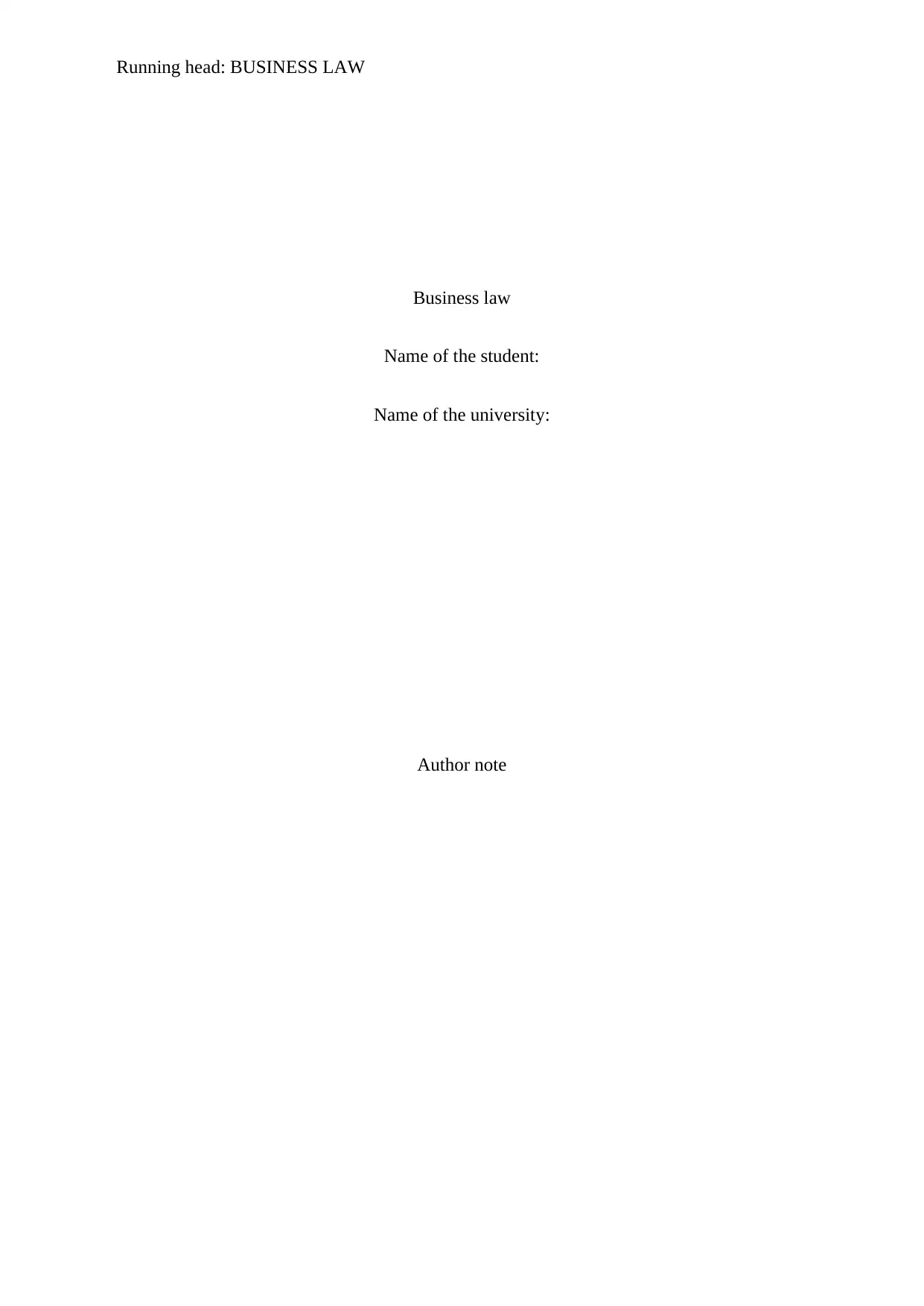
Running head: BUSINESS LAW
Business law
Name of the student:
Name of the university:
Author note
Business law
Name of the student:
Name of the university:
Author note
Paraphrase This Document
Need a fresh take? Get an instant paraphrase of this document with our AI Paraphraser
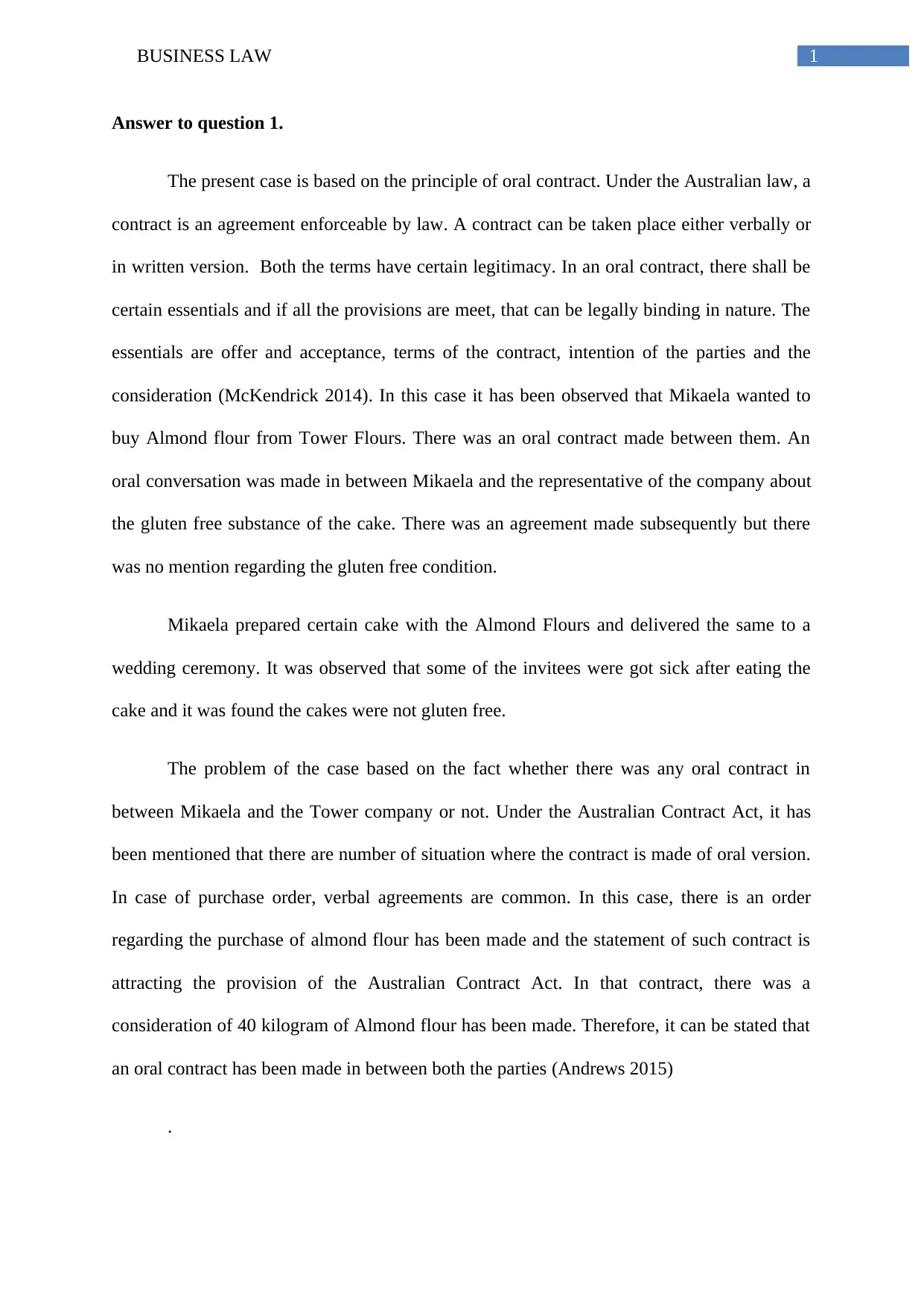
1BUSINESS LAW
Answer to question 1.
The present case is based on the principle of oral contract. Under the Australian law, a
contract is an agreement enforceable by law. A contract can be taken place either verbally or
in written version. Both the terms have certain legitimacy. In an oral contract, there shall be
certain essentials and if all the provisions are meet, that can be legally binding in nature. The
essentials are offer and acceptance, terms of the contract, intention of the parties and the
consideration (McKendrick 2014). In this case it has been observed that Mikaela wanted to
buy Almond flour from Tower Flours. There was an oral contract made between them. An
oral conversation was made in between Mikaela and the representative of the company about
the gluten free substance of the cake. There was an agreement made subsequently but there
was no mention regarding the gluten free condition.
Mikaela prepared certain cake with the Almond Flours and delivered the same to a
wedding ceremony. It was observed that some of the invitees were got sick after eating the
cake and it was found the cakes were not gluten free.
The problem of the case based on the fact whether there was any oral contract in
between Mikaela and the Tower company or not. Under the Australian Contract Act, it has
been mentioned that there are number of situation where the contract is made of oral version.
In case of purchase order, verbal agreements are common. In this case, there is an order
regarding the purchase of almond flour has been made and the statement of such contract is
attracting the provision of the Australian Contract Act. In that contract, there was a
consideration of 40 kilogram of Almond flour has been made. Therefore, it can be stated that
an oral contract has been made in between both the parties (Andrews 2015)
.
Answer to question 1.
The present case is based on the principle of oral contract. Under the Australian law, a
contract is an agreement enforceable by law. A contract can be taken place either verbally or
in written version. Both the terms have certain legitimacy. In an oral contract, there shall be
certain essentials and if all the provisions are meet, that can be legally binding in nature. The
essentials are offer and acceptance, terms of the contract, intention of the parties and the
consideration (McKendrick 2014). In this case it has been observed that Mikaela wanted to
buy Almond flour from Tower Flours. There was an oral contract made between them. An
oral conversation was made in between Mikaela and the representative of the company about
the gluten free substance of the cake. There was an agreement made subsequently but there
was no mention regarding the gluten free condition.
Mikaela prepared certain cake with the Almond Flours and delivered the same to a
wedding ceremony. It was observed that some of the invitees were got sick after eating the
cake and it was found the cakes were not gluten free.
The problem of the case based on the fact whether there was any oral contract in
between Mikaela and the Tower company or not. Under the Australian Contract Act, it has
been mentioned that there are number of situation where the contract is made of oral version.
In case of purchase order, verbal agreements are common. In this case, there is an order
regarding the purchase of almond flour has been made and the statement of such contract is
attracting the provision of the Australian Contract Act. In that contract, there was a
consideration of 40 kilogram of Almond flour has been made. Therefore, it can be stated that
an oral contract has been made in between both the parties (Andrews 2015)
.
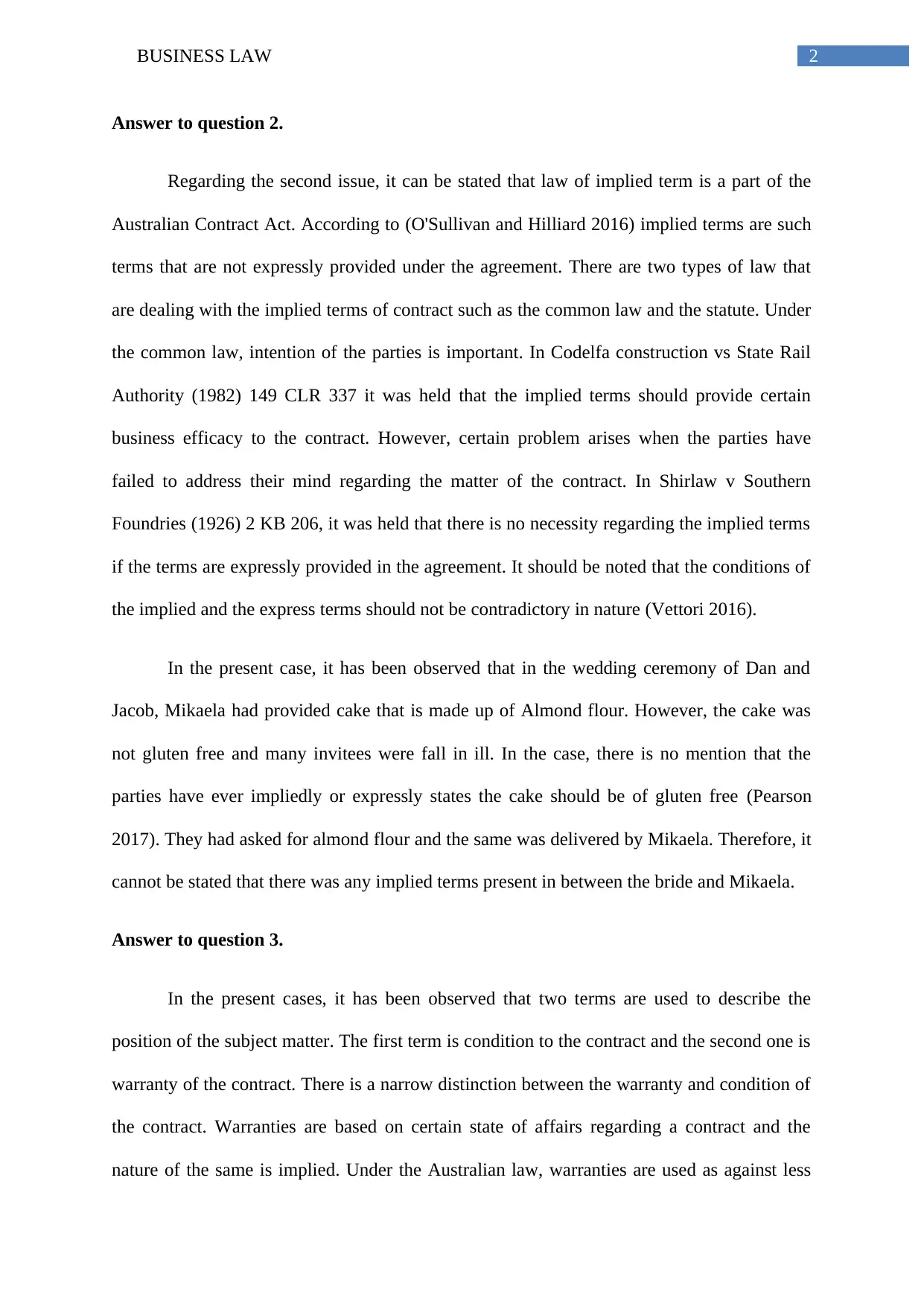
2BUSINESS LAW
Answer to question 2.
Regarding the second issue, it can be stated that law of implied term is a part of the
Australian Contract Act. According to (O'Sullivan and Hilliard 2016) implied terms are such
terms that are not expressly provided under the agreement. There are two types of law that
are dealing with the implied terms of contract such as the common law and the statute. Under
the common law, intention of the parties is important. In Codelfa construction vs State Rail
Authority (1982) 149 CLR 337 it was held that the implied terms should provide certain
business efficacy to the contract. However, certain problem arises when the parties have
failed to address their mind regarding the matter of the contract. In Shirlaw v Southern
Foundries (1926) 2 KB 206, it was held that there is no necessity regarding the implied terms
if the terms are expressly provided in the agreement. It should be noted that the conditions of
the implied and the express terms should not be contradictory in nature (Vettori 2016).
In the present case, it has been observed that in the wedding ceremony of Dan and
Jacob, Mikaela had provided cake that is made up of Almond flour. However, the cake was
not gluten free and many invitees were fall in ill. In the case, there is no mention that the
parties have ever impliedly or expressly states the cake should be of gluten free (Pearson
2017). They had asked for almond flour and the same was delivered by Mikaela. Therefore, it
cannot be stated that there was any implied terms present in between the bride and Mikaela.
Answer to question 3.
In the present cases, it has been observed that two terms are used to describe the
position of the subject matter. The first term is condition to the contract and the second one is
warranty of the contract. There is a narrow distinction between the warranty and condition of
the contract. Warranties are based on certain state of affairs regarding a contract and the
nature of the same is implied. Under the Australian law, warranties are used as against less
Answer to question 2.
Regarding the second issue, it can be stated that law of implied term is a part of the
Australian Contract Act. According to (O'Sullivan and Hilliard 2016) implied terms are such
terms that are not expressly provided under the agreement. There are two types of law that
are dealing with the implied terms of contract such as the common law and the statute. Under
the common law, intention of the parties is important. In Codelfa construction vs State Rail
Authority (1982) 149 CLR 337 it was held that the implied terms should provide certain
business efficacy to the contract. However, certain problem arises when the parties have
failed to address their mind regarding the matter of the contract. In Shirlaw v Southern
Foundries (1926) 2 KB 206, it was held that there is no necessity regarding the implied terms
if the terms are expressly provided in the agreement. It should be noted that the conditions of
the implied and the express terms should not be contradictory in nature (Vettori 2016).
In the present case, it has been observed that in the wedding ceremony of Dan and
Jacob, Mikaela had provided cake that is made up of Almond flour. However, the cake was
not gluten free and many invitees were fall in ill. In the case, there is no mention that the
parties have ever impliedly or expressly states the cake should be of gluten free (Pearson
2017). They had asked for almond flour and the same was delivered by Mikaela. Therefore, it
cannot be stated that there was any implied terms present in between the bride and Mikaela.
Answer to question 3.
In the present cases, it has been observed that two terms are used to describe the
position of the subject matter. The first term is condition to the contract and the second one is
warranty of the contract. There is a narrow distinction between the warranty and condition of
the contract. Warranties are based on certain state of affairs regarding a contract and the
nature of the same is implied. Under the Australian law, warranties are used as against less
⊘ This is a preview!⊘
Do you want full access?
Subscribe today to unlock all pages.

Trusted by 1+ million students worldwide
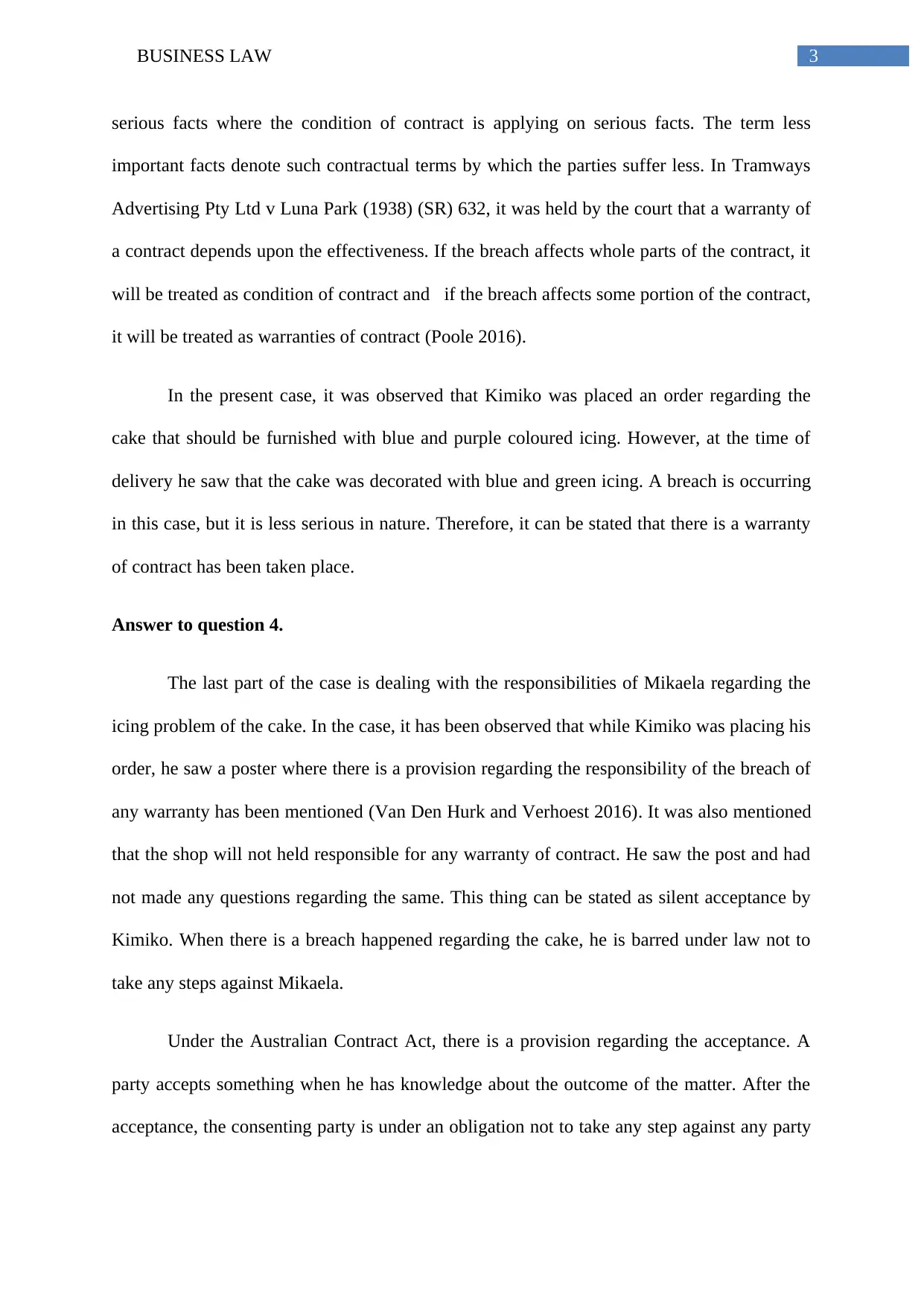
3BUSINESS LAW
serious facts where the condition of contract is applying on serious facts. The term less
important facts denote such contractual terms by which the parties suffer less. In Tramways
Advertising Pty Ltd v Luna Park (1938) (SR) 632, it was held by the court that a warranty of
a contract depends upon the effectiveness. If the breach affects whole parts of the contract, it
will be treated as condition of contract and if the breach affects some portion of the contract,
it will be treated as warranties of contract (Poole 2016).
In the present case, it was observed that Kimiko was placed an order regarding the
cake that should be furnished with blue and purple coloured icing. However, at the time of
delivery he saw that the cake was decorated with blue and green icing. A breach is occurring
in this case, but it is less serious in nature. Therefore, it can be stated that there is a warranty
of contract has been taken place.
Answer to question 4.
The last part of the case is dealing with the responsibilities of Mikaela regarding the
icing problem of the cake. In the case, it has been observed that while Kimiko was placing his
order, he saw a poster where there is a provision regarding the responsibility of the breach of
any warranty has been mentioned (Van Den Hurk and Verhoest 2016). It was also mentioned
that the shop will not held responsible for any warranty of contract. He saw the post and had
not made any questions regarding the same. This thing can be stated as silent acceptance by
Kimiko. When there is a breach happened regarding the cake, he is barred under law not to
take any steps against Mikaela.
Under the Australian Contract Act, there is a provision regarding the acceptance. A
party accepts something when he has knowledge about the outcome of the matter. After the
acceptance, the consenting party is under an obligation not to take any step against any party
serious facts where the condition of contract is applying on serious facts. The term less
important facts denote such contractual terms by which the parties suffer less. In Tramways
Advertising Pty Ltd v Luna Park (1938) (SR) 632, it was held by the court that a warranty of
a contract depends upon the effectiveness. If the breach affects whole parts of the contract, it
will be treated as condition of contract and if the breach affects some portion of the contract,
it will be treated as warranties of contract (Poole 2016).
In the present case, it was observed that Kimiko was placed an order regarding the
cake that should be furnished with blue and purple coloured icing. However, at the time of
delivery he saw that the cake was decorated with blue and green icing. A breach is occurring
in this case, but it is less serious in nature. Therefore, it can be stated that there is a warranty
of contract has been taken place.
Answer to question 4.
The last part of the case is dealing with the responsibilities of Mikaela regarding the
icing problem of the cake. In the case, it has been observed that while Kimiko was placing his
order, he saw a poster where there is a provision regarding the responsibility of the breach of
any warranty has been mentioned (Van Den Hurk and Verhoest 2016). It was also mentioned
that the shop will not held responsible for any warranty of contract. He saw the post and had
not made any questions regarding the same. This thing can be stated as silent acceptance by
Kimiko. When there is a breach happened regarding the cake, he is barred under law not to
take any steps against Mikaela.
Under the Australian Contract Act, there is a provision regarding the acceptance. A
party accepts something when he has knowledge about the outcome of the matter. After the
acceptance, the consenting party is under an obligation not to take any step against any party
Paraphrase This Document
Need a fresh take? Get an instant paraphrase of this document with our AI Paraphraser
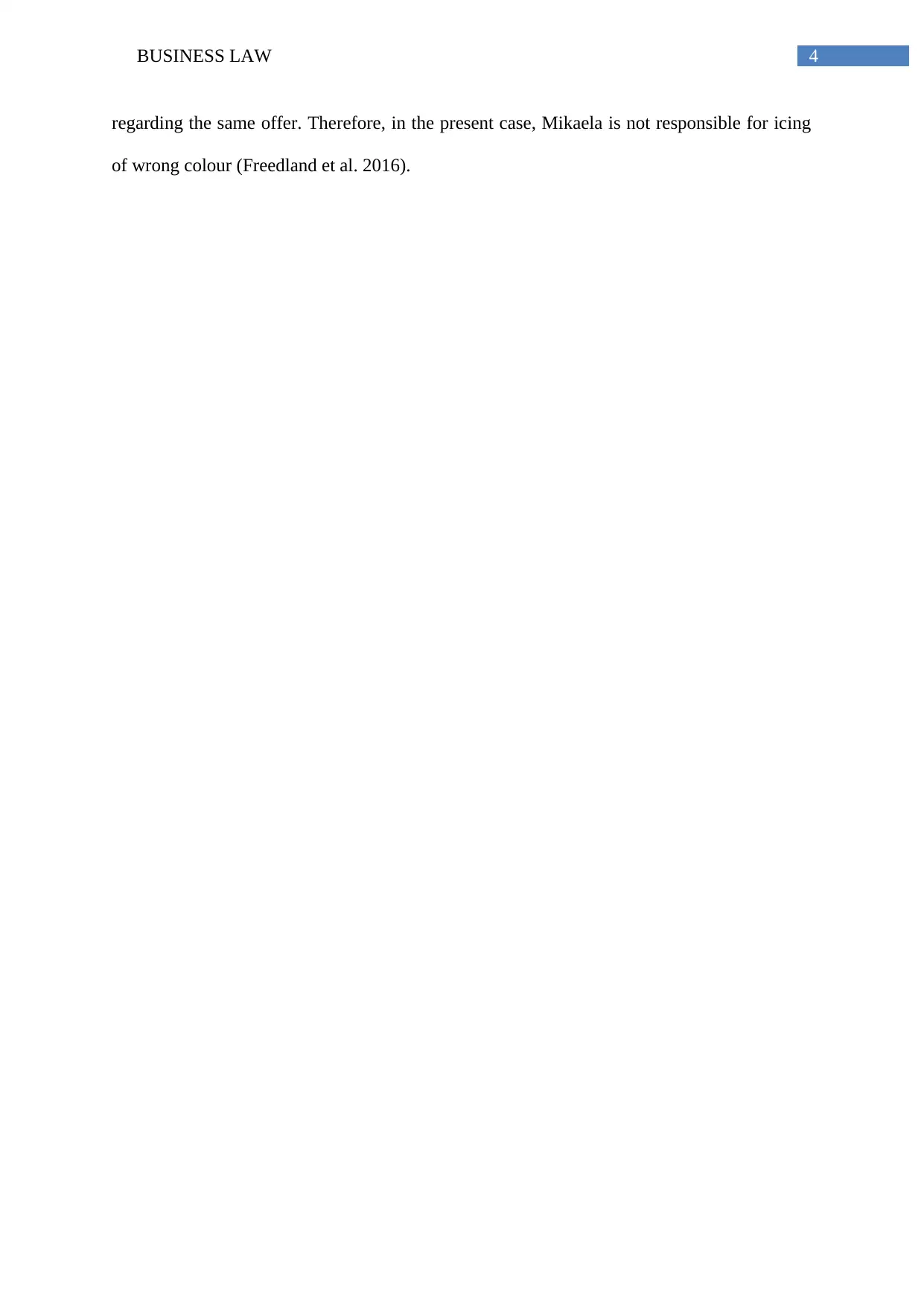
4BUSINESS LAW
regarding the same offer. Therefore, in the present case, Mikaela is not responsible for icing
of wrong colour (Freedland et al. 2016).
regarding the same offer. Therefore, in the present case, Mikaela is not responsible for icing
of wrong colour (Freedland et al. 2016).
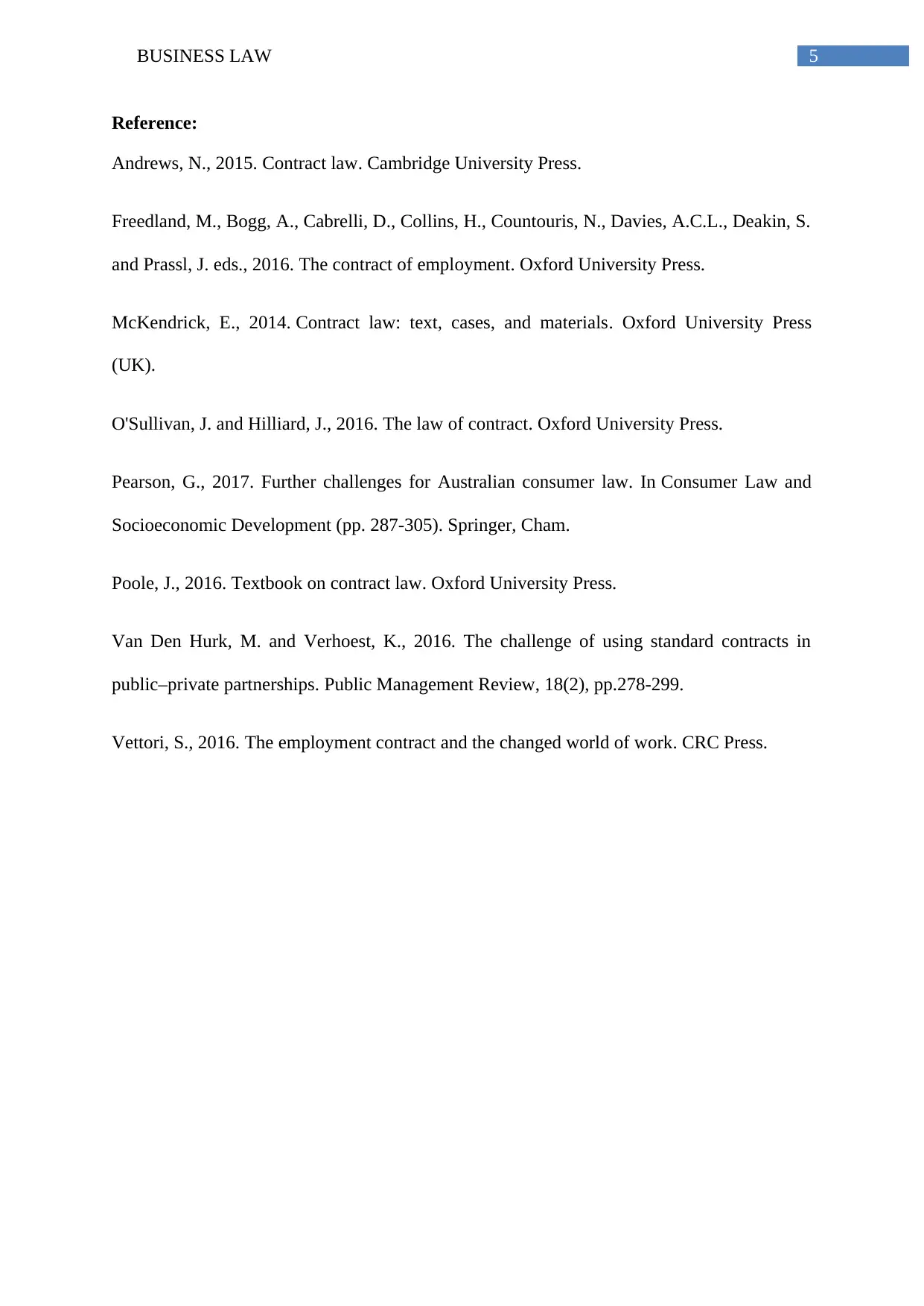
5BUSINESS LAW
Reference:
Andrews, N., 2015. Contract law. Cambridge University Press.
Freedland, M., Bogg, A., Cabrelli, D., Collins, H., Countouris, N., Davies, A.C.L., Deakin, S.
and Prassl, J. eds., 2016. The contract of employment. Oxford University Press.
McKendrick, E., 2014. Contract law: text, cases, and materials. Oxford University Press
(UK).
O'Sullivan, J. and Hilliard, J., 2016. The law of contract. Oxford University Press.
Pearson, G., 2017. Further challenges for Australian consumer law. In Consumer Law and
Socioeconomic Development (pp. 287-305). Springer, Cham.
Poole, J., 2016. Textbook on contract law. Oxford University Press.
Van Den Hurk, M. and Verhoest, K., 2016. The challenge of using standard contracts in
public–private partnerships. Public Management Review, 18(2), pp.278-299.
Vettori, S., 2016. The employment contract and the changed world of work. CRC Press.
Reference:
Andrews, N., 2015. Contract law. Cambridge University Press.
Freedland, M., Bogg, A., Cabrelli, D., Collins, H., Countouris, N., Davies, A.C.L., Deakin, S.
and Prassl, J. eds., 2016. The contract of employment. Oxford University Press.
McKendrick, E., 2014. Contract law: text, cases, and materials. Oxford University Press
(UK).
O'Sullivan, J. and Hilliard, J., 2016. The law of contract. Oxford University Press.
Pearson, G., 2017. Further challenges for Australian consumer law. In Consumer Law and
Socioeconomic Development (pp. 287-305). Springer, Cham.
Poole, J., 2016. Textbook on contract law. Oxford University Press.
Van Den Hurk, M. and Verhoest, K., 2016. The challenge of using standard contracts in
public–private partnerships. Public Management Review, 18(2), pp.278-299.
Vettori, S., 2016. The employment contract and the changed world of work. CRC Press.
⊘ This is a preview!⊘
Do you want full access?
Subscribe today to unlock all pages.

Trusted by 1+ million students worldwide
1 out of 6
Related Documents
Your All-in-One AI-Powered Toolkit for Academic Success.
+13062052269
info@desklib.com
Available 24*7 on WhatsApp / Email
![[object Object]](/_next/static/media/star-bottom.7253800d.svg)
Unlock your academic potential
Copyright © 2020–2026 A2Z Services. All Rights Reserved. Developed and managed by ZUCOL.





